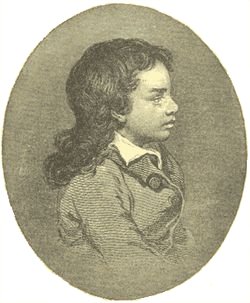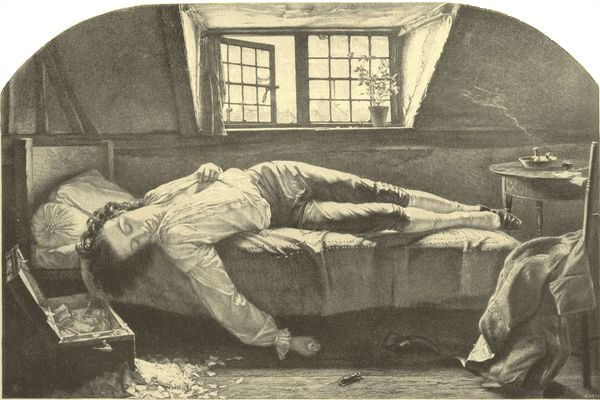 Thomas Chatterton, born on November 20, 1752, in Bristol, England, is remembered as one of the most enigmatic and tragic figures in English literature. Often hailed as a literary prodigy, Chatterton's life was marked by his exceptional talent and untimely death.
Thomas Chatterton, born on November 20, 1752, in Bristol, England, is remembered as one of the most enigmatic and tragic figures in English literature. Often hailed as a literary prodigy, Chatterton's life was marked by his exceptional talent and untimely death.
Chatterton displayed remarkable literary skills from a young age. By the age of eleven, he began composing poetry, showing an extraordinary command of language and a deep interest in antiquity. His fascination with medieval history led him to create an elaborate literary hoax: he wrote a series of poems and documents attributed to a fictional 15th-century monk named Thomas Rowley. These works, written in pseudo-medieval English, were so convincing that many believed them to be genuine historical artifacts.
Despite his talent, Chatterton struggled to gain financial stability and recognition. In 1770, he moved to London, hoping to establish himself as a writer. He contributed to various periodicals and tried to make a living through his writing, but his efforts met with limited success. The literary world of London proved harsh and unwelcoming to the young poet, who was often dismissed and overlooked.
 Tragically, Chatterton's life ended in despair. On August 24, 1770, at the age of 17, he committed suicide by ingesting arsenic. His death shocked the literary community and led to a reevaluation of his work. Posthumously, Chatterton gained considerable fame, and his poems were recognized for their brilliance and originality. Writers such as Samuel Taylor Coleridge and William Wordsworth hailed him as a genius, and his life and work became symbols of the Romantic ideal of the misunderstood, unappreciated artist.
Tragically, Chatterton's life ended in despair. On August 24, 1770, at the age of 17, he committed suicide by ingesting arsenic. His death shocked the literary community and led to a reevaluation of his work. Posthumously, Chatterton gained considerable fame, and his poems were recognized for their brilliance and originality. Writers such as Samuel Taylor Coleridge and William Wordsworth hailed him as a genius, and his life and work became symbols of the Romantic ideal of the misunderstood, unappreciated artist.
Chatterton's legacy endures as a cautionary tale of youthful genius and the often harsh realities faced by creative talents. His poetry, particularly the Rowley works, continues to be studied and admired for its inventive language and historical imagination, securing his place in the annals of English literature. |
 Thomas Chatterton, born on November 20, 1752, in Bristol, England, is remembered as one of the most enigmatic and tragic figures in English literature. Often hailed as a literary prodigy, Chatterton's life was marked by his exceptional talent and untimely death.
Thomas Chatterton, born on November 20, 1752, in Bristol, England, is remembered as one of the most enigmatic and tragic figures in English literature. Often hailed as a literary prodigy, Chatterton's life was marked by his exceptional talent and untimely death.
 Tragically, Chatterton's life ended in despair. On August 24, 1770, at the age of 17, he committed suicide by ingesting arsenic. His death shocked the literary community and led to a reevaluation of his work. Posthumously, Chatterton gained considerable fame, and his poems were recognized for their brilliance and originality. Writers such as Samuel Taylor Coleridge and William Wordsworth hailed him as a genius, and his life and work became symbols of the Romantic ideal of the misunderstood, unappreciated artist.
Tragically, Chatterton's life ended in despair. On August 24, 1770, at the age of 17, he committed suicide by ingesting arsenic. His death shocked the literary community and led to a reevaluation of his work. Posthumously, Chatterton gained considerable fame, and his poems were recognized for their brilliance and originality. Writers such as Samuel Taylor Coleridge and William Wordsworth hailed him as a genius, and his life and work became symbols of the Romantic ideal of the misunderstood, unappreciated artist.








